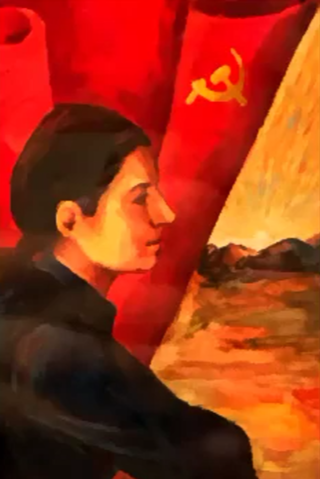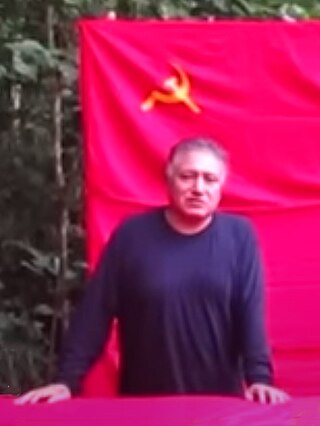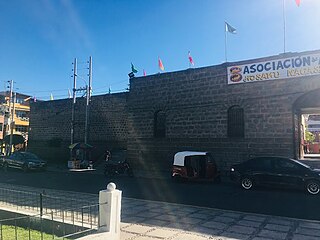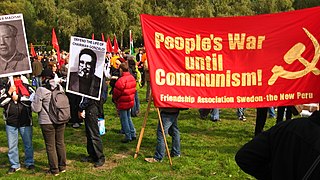
The Shining Path, self-named the Communist Party of Peru, is a far-left political party and guerrilla group in Peru, following Marxism–Leninism–Maoism and Gonzalo Thought. Academics often refer to the group as the Communist Party of Peru – Shining Path to distinguish it from other communist parties in Peru.

Manuel Rubén Abimael Guzmán Reynoso, also known by his nom de guerreChairman Gonzalo, was a Peruvian Maoist guerrilla leader. He founded the organization Communist Party of Peru – Shining Path (PCP-SL) in 1969 and led a rebellion against the Peruvian government until his capture by authorities on 12 September 1992. He was subsequently sentenced to life imprisonment for terrorism and treason.

María Elena Moyano Delgado was an Afro-Peruvian community organizer and feminist who was assassinated by the Shining Path. She grew up in poverty in the Villa El Salvador pueblo joven, then became involved in local activism. She was twice president of FEPOMUVES and at the time of her death was deputy mayor. Her funeral was attended by 300,000 people and resulted in a downturn in support for the Shining Path. She received the Peruvian Order of Merit posthumously.

The internal conflict in Peru is an armed conflict between the Government of Peru and the Maoist guerrilla group Shining Path. The conflict's main phase began on 17 May 1980 and ended in December 2000. From 1982 to 1997 the Túpac Amaru Revolutionary Movement waged its own insurgency as a Marxist–Leninist rival to the Shining Path. As fighting intensified in the 1980s, the Peruvian government had one of the worst human rights records in the Western Hemisphere; Peru experienced the most forced disappearances in the world during the period while the Peruvian Armed Forces acted with impunity throughout the conflict, sometimes massacring entire villages.
Chuschi District is one of six districts of the Cangallo Province in Peru. It is known for being the site of the first attack perpetrated by the maoist terrorist organization Shining Path, initiating the Peruvian conflict.

Orlando Alejandro Borda Casafranca, who used the nom de guerre Comrade Alipio, was a Shining Path commander and one of the highest-ranking members of the Shining Path. He was killed on 11 August 2013 in a Peruvian Army operation in Llochegua.

Augusta Deyanira La Torre Carrasco, also known as Comrade Norah, was a Peruvian communist, recognized as the number two in command of Shining Path. La Torre's influence on her husband, Shining Path founder Abimael Guzmán, is credited with establishing equality for women with regard to participation within the revolutionary organization, and during its militant actions.

Comrade José is a Peruvian communist militant, leader of the Militarized Communist Party of Peru, an offshoot of the Marxist–Leninist–Maoist guerrilla Shining Path. The group is present in the VRAEM region.

The Assault of Ayacucho prison was an incident in the Peruvian city of Ayacucho, also known as Huamanga, on March 2, 1982. A group of 150 armed terrorists, members of the Sendero Luminoso, or Shining Path, staged simultaneous assaults on two local police stations before staging an assault on the prison, resulting in the release of 255 inmates. After a 5-hour battle, 16 people, including two prison guards, were dead and 12 people were wounded.

Gonzalo Thought, also known as Marxism–Leninism–Maoism–Gonzalo Thought and Gonzaloism, is an ideological doctrine developed by Peruvian revolutionary Abimael Guzmán as an interpretation of Peruvian reality based on Marxism–Leninism–Maoism.

The New Peru Friendship Association is a union of series of Marxist–Leninist–Maoist organizations that support the Peruvian insurgent group Shining Path that operate in different countries. This group is in charge of collecting money and sending money clandestinely to the terrorist group. They are also in charge of spreading Abimael Guzmán's line of Marxism-Leninism-Maoism throughout the world.

The San Miguel del Ene attack was a massacre on 23 May 2021 in San Miguel del Ene, a rural area in the Vizcatán del Ene District of Satipo Province in Peru, in which 18 people were killed. The massacre was most likely perpetrated by the Militarized Communist Party of Peru (MPCP), a split of the Maoist terrorist organization Shining Path. The attack occurred in the Valle de los Ríos Apurímac, Ene y Mantaro (VRAEM) conflict region, where the group operates.

The Militarized Communist Party of Peru is a political party and militant group in Peru that follows Marxism–Leninism–Maoism and participates in the communist insurgency in Peru. It is considered a terrorist organization by the government of Peru. The MPCP operates primarily in the VRAEM area and is involved in the area's coca production. Comrade José has been the leader of the MPCP since its official creation in 2018 after its final split from the declining Shining Path guerilla group.
The Chuschi ballot burning incident occurred on the night of May 17, 1980, in the Peruvian district of Chuschi in Ayacucho. It was the first attack perpetrated by the maoist terrorist organization Shining Path.

Deng Xiaoping's dogs is a term used by modern Peruvian historiography to refer to a case of animal abuse perpetrated in Lima by Shining Path, a Maoist terror group, in response to Chinese leader Deng Xiaoping's unorthodox opening economic reform, distancing himself from the thoughts of Mao Zedong, founder of the People's Republic of China.
The Popular Artist Movement was a mass organization of the Communist Party of Peru-Shining Path formed in 1988. Its purpose was to utilize artists to disseminate political propaganda to the population through the art of sloganeering, with particular attention to the universities. The MAP regularly incorporated folklore in its work. Although the exact connection between Shining Path's central apparatus and MAP is disputed, with some considering it as an independent development from the party, the MAP was a contributing effort to the communists' protracted "people's war."
The Popular Intellectual Movement was an academic-based mass organization created by the Communist Party of Peru-Shining Path in 1979 as part of the party's Fourth Expanded Plenary Session, which defined the structure and duties of various legal fronts to serve recruitment of the united front.
DIRCOTE Museum is a museum located in the premises of the National Directorate against Terrorism (DIRCOTE) on Spain Avenue in the historic centre of Lima, managed by the National Police of Peru and which exhibits objects seized from the Shining Path and Túpac Amaru Revolutionary Movement (MRTA) terrorist groups during the internal armed conflict that devastated Peru during the 1980s and 1990s.

Songs of the Shining Trenches of Combat is a musical album containing communist songs and hymns written by members of the Communist Party of Peru. Published in 1999, it was recorded clandestinely by imprisoned members and sympathizers of the CPP between 1990 and 1992 in the Miguel Castro Castro and the Lurigancho Penitentiary.

The Shining Path remnants are factions derived from the armed group that split off after the peace agreement between the imprisoned Abimael Guzmán and the Peruvian State in 1993. These include the Sendero Luminoso del Alto Huallaga (disbanded), the Mantaro Rojo Base Committee and the Militarized Communist Party of Peru.














